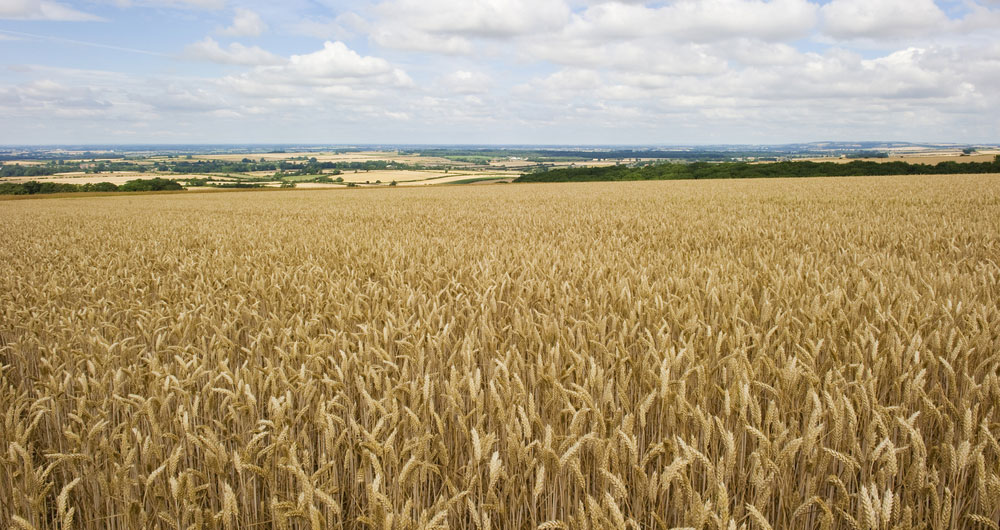The NFU is a key stakeholder in the Agricultural Productivity Task Force (APTF), which is co-chaired by NFU Vice President Tom Bradshaw. The APTF represents a unique partnership between industry and Defra to progress the issue of productivity. As such, the NFU is undertaking a project to examine how the arable industry might improve farmer-centric data on nitrogen use efficiency (NUE) in wheat.
How to get involved
Click here to take our quick online survey
It takes less than 10 minutes to submit some information on your 2018/19 winter wheat crop to help us gather data on nitrogen use efficiency. Subject to the information you submit, the results of the survey will help you to benchmark your data against the average.
Why are we doing this?
Productivity, and the need to grow it, has been a buzz word in UK agriculture for several years. It can often be confused with production, but is essentially the efficiency with which a business, sector, industry, and economy convert physical resources into marketable output.
There has been much discussion about the stagnation of UK agricultural productivity growth versus competitors by comparing a measure called total factor productivity (TFP). While TFP is a good measure to make international comparisons with, it is too high level to help a sector understand where the barriers to and opportunities for future growth are.
In practical terms, there is unlikely to be one single measure that typifies productivity for a sector. It is more likely to be several metrics that link to the key underlying inputs of a sector.
For the arable sector, yield has traditionally been used as a proxy for productivity. However, although this might demonstrate the efficiency of land use, it is unlikely to be sufficient to be a catch all indicator of productivity given the era of volatile prices, costs and weather that the sector finds itself in.
With BPS gradually being phased out, productivity growth is one of the key avenues the arable industry must embrace to support competitiveness and resilience.
Good data is critical
One of the key barriers facing our understanding of productivity is the lack of practical data that focuses on specific inputs, their efficiency of use, and sources of variation. Without such data, an industry does not progress as there is no baseline and no method of measuring progress.
Where such data is available, key performance indicators (KPIs) come into play, which opens a whole world of opportunity for the industry, sectors, and businesses to measure progress, compare and set targets.
Out of the agricultural sectors in the UK, poultry pretty much leads the way in productivity KPIs with feed-use-efficiency a key factor in industry league tables.
Establishing farmer-centric KPIs
Academics and economists can, and probably do, come up with several KPIs for agriculture, but these are likely to be complex and somewhat detached from the practicality of the industry. As such, the industry simply can not engage.
This makes simplicity of indicators incredibly important and a key theme. That is what makes crop yield an accessible indicator, but as discussed before, this measure simply doesn’t cover critical factors impacting productivity of the arable sector.
Nitrogen use efficiency has been selected for this pilot given both the commercial relevance, due to the significant cost of fertiliser, and the environmental perspective – manufactured nitrogen is a key source of the sector's carbon footprint.
Why should I take part?
If you would like to take part in the project you will be asked to submit some data on your 2019 wheat crop, which will remain confidential to you.
In return, you will be able to see how you have performed versus the group average and the key drivers of variation.
The type of data collected is likely to include:
- Crop yield
- Amount of artificial nitrogen fertiliser applied
- Target market
- Type of product used
- Usage of organic materials
- Application technology
- Previous cropping
- Predominant soil type and establishment
How to get involved
NFU members: If you are interested in taking part in this pilot project, please contact the NFU's agrifood policy delivery manager Jack Watts. Click here to email Jack or call 07787 145505.
More from NFUonline:
- NFU President supports cross-industry productivity drive
- 26 ways farmers are doing their bit for net zero
- Download our Back British Farming Day report: British Farming: Setting the standard
- Watch now: Your weekly video update from the President
- Join our virtual events this party conference season
- NFU Live: Events from the NFU this autumn

